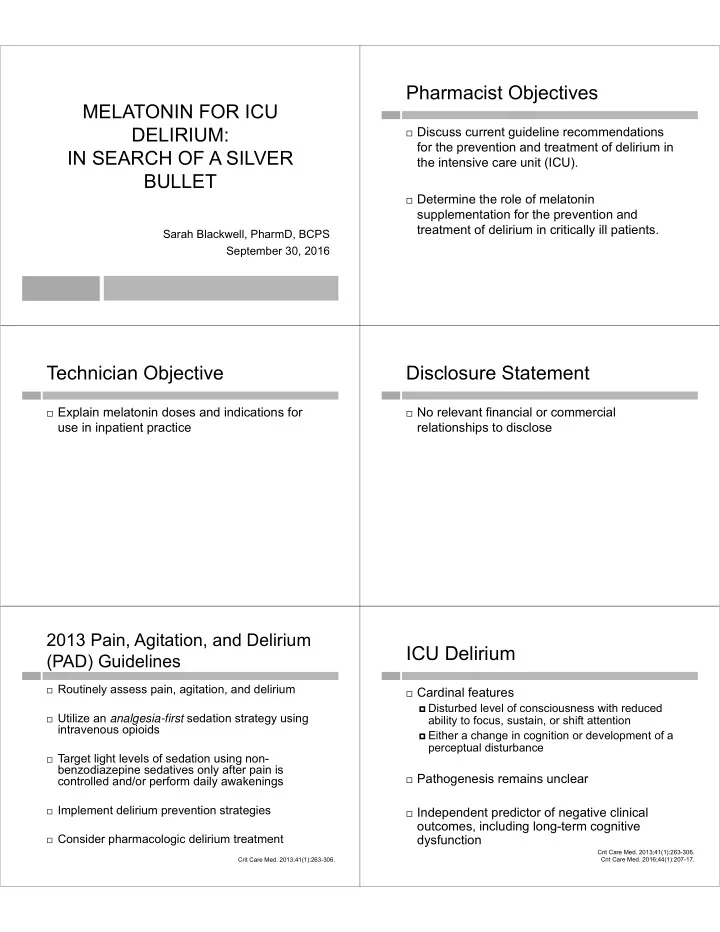

Pharmacist Objectives MELATONIN FOR ICU DELIRIUM: Discuss current guideline recommendations for the prevention and treatment of delirium in IN SEARCH OF A SILVER the intensive care unit (ICU). BULLET Determine the role of melatonin supplementation for the prevention and treatment of delirium in critically ill patients. Sarah Blackwell, PharmD, BCPS September 30, 2016 Technician Objective Disclosure Statement Explain melatonin doses and indications for No relevant financial or commercial use in inpatient practice relationships to disclose 2013 Pain, Agitation, and Delirium ICU Delirium (PAD) Guidelines Routinely assess pain, agitation, and delirium Cardinal features Disturbed level of consciousness with reduced Utilize an analgesia-first sedation strategy using ability to focus, sustain, or shift attention intravenous opioids Either a change in cognition or development of a perceptual disturbance Target light levels of sedation using non- benzodiazepine sedatives only after pain is Pathogenesis remains unclear controlled and/or perform daily awakenings Implement delirium prevention strategies Independent predictor of negative clinical outcomes, including long-term cognitive Consider pharmacologic delirium treatment dysfunction Crit Care Med. 2013;41(1):263-306. Crit Care Med. 2013;41(1):263-306. Crit Care Med. 2016;44(1):207-17.
PAD Guidelines: Delirium PAD Guidelines: Delirium Prevention Treatment Avoid benzodiazepines in most patients Atypical antipsychotics may reduce delirium duration Early mobilization There is no published evidence that treatment with haloperidol reduces the duration of ICU Frequent orientation to person, place, and time delirium Protection of sleep-wake cycles Dexmedetomidine recommended for sedation over benzodiazepines to decrease delirium Pharmacologic prophylaxis provides no benefit duration Crit Care Med. 2013;41(1):263-306. Crit Care Med. 2013;41(1):263-306. Circadian Rhythm and ICU Melatonin for Delirium Delirium Prevention Sleep-wake cycles are reliably disrupted in critical Study Intervention Implications illness Melatonin 5 mg, • Decreased delirium in the melatonin Sultan SS. midazolam group Saudi J Circadian dysrhythmias and delirium appear to be 7.5 mg, or • Extensive exclusion criteria Anaesth. 2010; intricately related clonidine 0.1 • Dosed the night prior to the scheduled 4(3):169-73. mg for 2 operation and 90 minutes preoperatively doses Chronotherapy aims to reset abnormal circadian • Decreased delirium in the melatonin Al-Aama T, et rhythms group al. Int J Geriatr Melatonin 0.5 • No differences between groups in sleep Morning exposure to bright light Psychiatry. mg nightly for outcomes 2011; up to 14 days Concentrated nighttime dark periods • Elderly patients on a general medical 26(7):687-94. Melatonin supplementation or agonism ward • Similar incidence of delirium between de Jonghe A, et Crit Care. 2009;13(6):234-41. Melatonin 3 groups Crit Care Med. 2016;44(1):207-17. al CMAJ Ramelteon for Delirium Melatonin for Sleep in the Critically Ill Prevention Effect of ramelteon 8 mg versus placebo on the Interventio Study Implications incidence of delirium n • Stable hemodynamics required Shilo, et al. Melatonin • Increased total sleep time with Delirium occurred in 3% of the ramelteon group versus Chronobiol Int. SR 3 mg 32% of the placebo group (p = 0.003) melatonin 2000;17(1):71-6. for 2 nights • No assessment of delirium • Similar duration nocturnal and diurnal No difference in sleep-related outcomes sleep Ibrahim, et al. Crit Melatonin • Increased agitation in the melatonin Care Resusc. 3 mg for ≥2 Limitations group 2006; 8(3):187-91. nights Strict exclusion criteria, including patients requiring • Sleep duration and quality assessed by intubation bedside nurse Low severity of illness • Nocturnal sleep time increased one Japanese population Melatonin hour with melatonin Bourne, et al. Crit 10 mg for 4 • Deeper sleep with melatonin as Different appearance of ramelteon and placebo Care. 2008;12(2): nights measured by BIS JAMA Psychiatry. 2014;71(4):397- R52-60 403
Conclusions Self-Assessment Question KG is a 68 YOF admitted with severe sepsis due No robust or high quality evidence to suggest to pneumonia. She was intubated upon melatonin or melatonin agonists affect ICU admission and has been transferred to the ICU. delirium She has no pertinent PMH or social history. Which is the best option to implement for The mainstay of delirium prevention is early delirium prevention in this patient? progressive mobility A. Quetiapine 25 mg via NG tube three times daily B. Progressive mobility protocol beginning today It is reasonable to employ additional C. Melatonin 3 mg via NG tube at bedtime nonpharmacological interventions to control D. Lorazepam IV infusion titrated to attain a deep environmental stimuli and preserve circadian level of sedation rhythms
Recommend
More recommend